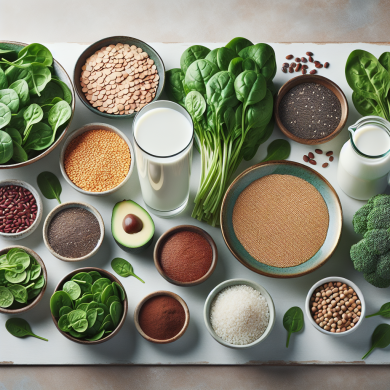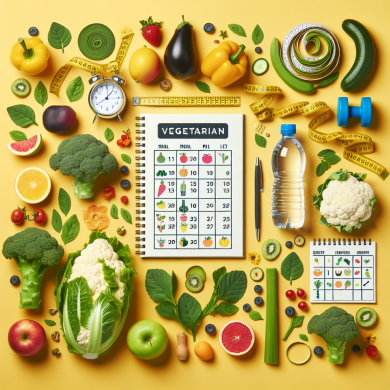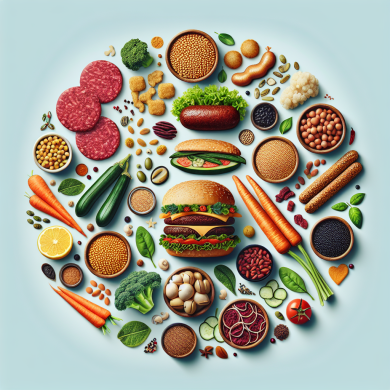Powering Athletes: The Vegetarian Diet Advantage
“`html
Powering Athletes: The Vegetarian Diet Advantage
In the world of sports, nutrition is a cornerstone of athletic performance. Athletes are constantly seeking dietary strategies that can enhance their performance, expedite recovery, and maintain optimal health. Traditionally, protein-heavy diets centered around meat have been the norm. However, an increasing number of athletes are turning to vegetarian diets, finding that these plant-based regimes can offer a competitive edge. This article explores the vegetarian diet’s benefits for athletes, dispels common myths, and provides practical tips for those considering making the switch.
The Rise of Vegetarianism Among Athletes
Over the past decade, there has been a noticeable shift towards vegetarian and plant-based diets in the athletic community. High-profile athletes such as tennis champion Venus Williams, ultramarathoner Scott Jurek, and professional soccer player Alex Morgan have publicly embraced vegetarianism, citing numerous health benefits and performance improvements. This trend is supported by a growing body of research suggesting that plant-based diets can provide all the necessary nutrients for peak athletic performance.
Nutritional Components of a Vegetarian Diet
A well-planned vegetarian diet is rich in fruits, vegetables, whole grains, legumes, nuts, and seeds. These foods are dense in essential vitamins, minerals, antioxidants, and phytochemicals that play critical roles in maintaining health and enhancing athletic performance.
Carbohydrates: The Primary Fuel Source
Carbohydrates are the primary energy source for athletes, particularly for endurance sports. Vegetarians can easily meet their carbohydrate needs through foods like whole grains (e.g., oatmeal, quinoa, brown rice), fruits, and vegetables. These foods not only provide energy but also contribute to glycogen storage, which is vital for sustained athletic performance.
Protein: Building Blocks for Muscles
One of the most common concerns regarding vegetarian diets is protein intake. However, numerous plant-based foods are excellent sources of protein. Legumes (e.g., lentils, chickpeas), soy products (e.g., tofu, tempeh), nuts, seeds, and whole grains are all rich in protein. With careful planning, vegetarian athletes can easily meet their protein requirements to support muscle repair and growth.
Fats: Essential for Recovery and Hormone Production
Healthy fats are crucial for recovery and hormone production. Vegetarian diets can include a variety of healthy fats from sources such as avocados, nuts, seeds, and olive oil. These fats are beneficial for reducing inflammation and supporting overall cardiovascular health.
Micronutrients: Vitamins and Minerals
Vegetarian diets tend to be higher in certain micronutrients, such as vitamin C, vitamin E, and magnesium, due to the high intake of fruits and vegetables. However, vegetarian athletes need to pay special attention to nutrients that might be less prevalent in their diet, such as vitamin B12, iron, zinc, and omega-3 fatty acids. Fortified foods and supplements can help bridge these gaps.
Benefits of a Vegetarian Diet for Athletes
Improved Cardiovascular Health
A vegetarian diet is typically lower in saturated fats and cholesterol, which can improve cardiovascular health. For athletes, a healthy heart is crucial for maintaining endurance and overall performance. Studies have shown that plant-based diets can lead to lower blood pressure and improved blood lipid profiles, reducing the risk of heart disease.
Enhanced Recovery and Reduced Inflammation
The antioxidant-rich nature of a vegetarian diet can aid in recovery by reducing oxidative stress and inflammation. Foods like berries, leafy greens, and nuts contain powerful antioxidants that help repair muscle damage and promote quicker recovery times. This can be particularly beneficial for athletes who engage in intense training sessions or competitions.
Weight Management and Body Composition
Vegetarian diets can contribute to better weight management and favorable body composition. They are generally lower in calories and higher in fiber, which can help athletes maintain a healthy weight and reduce body fat. This can translate to improved agility, speed, and endurance.
Digestive Health
The high fiber content of a vegetarian diet supports healthy digestion. Good digestive health is crucial for nutrient absorption and overall well-being. A healthy gut can enhance an athlete’s immune system and energy levels, contributing to optimal performance.
Addressing Common Myths
Vegetarian Diets Lack Sufficient Protein
Contrary to popular belief, vegetarian diets can provide ample protein. By incorporating a variety of plant-based protein sources throughout the day, athletes can easily meet their protein needs. It’s important to consume a diverse range of foods to ensure all essential amino acids are obtained.
Vegetarians Can’t Build Muscle
Muscle growth is not solely dependent on protein intake but also on total caloric intake and strength training. Vegetarian athletes have demonstrated that it is entirely possible to build and maintain muscle mass on a plant-based diet. The key is to consume adequate calories and engage in regular resistance training.
Vegetarian Diets Are Deficient in Key Nutrients
While some nutrients require careful planning, vegetarian diets can be nutritionally complete. Fortified foods and supplements, such as vitamin B12 and iron, can help bridge any potential gaps. Regular blood tests can also ensure that nutrient levels remain optimal.
Practical Tips for Vegetarian Athletes
Plan Your Meals
Meal planning is crucial for vegetarian athletes to ensure they meet their nutritional needs. Focus on variety and balance, incorporating a wide range of fruits, vegetables, grains, and protein sources.
Monitor Nutrient Intake
Pay attention to nutrients that might be lacking, such as vitamin B12, iron, and omega-3 fatty acids. Consider incorporating fortified foods or supplements as needed.
Stay Hydrated
Proper hydration is essential for all athletes. Ensure adequate fluid intake before, during, and after workouts to maintain peak performance and aid recovery.
Listen to Your Body
Every athlete is unique, and dietary needs can vary. Listen to your body’s signals and adjust your diet accordingly. Consulting with a registered dietitian who specializes in sports nutrition can provide personalized guidance.
Conclusion
The vegetarian diet offers numerous advantages for athletes, from improved cardiovascular health and enhanced recovery to better weight management and digestive health. By carefully planning their diets and paying attention to key nutrients, vegetarian athletes can achieve optimal performance and enjoy the array of health benefits that plant-based eating provides. As more athletes embrace vegetarianism, it becomes increasingly clear that plant-powered performance is not only feasible but can offer a substantial advantage in the competitive world of sports.
“`















Add comment